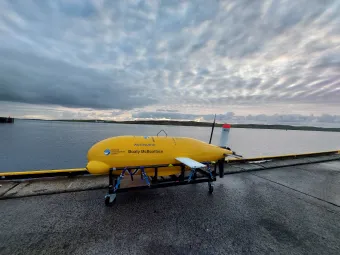
The UK is at the forefront of a global shift to using high-tech robots to explore the ocean. The Natural Environment Research Council (NERC) BIO-Carbon programme is investigating how marine life stores carbon dioxide (CO2).
Alongside the ship-based research in 2024 a fleet of autonomous robots, funded via NERC’s Net Zero Oceanographic Capability (NZOC) programme, will collect data in a different way that is both low-carbon and novel in its approach to marine science.
NZOC has been established to reduce the carbon dioxide emissions associated with ocean research which often takes place in remote and challenging environments. BIO-Carbon is an exciting and ambitious research programme that seeks to understand how marine life allows the ocean to store CO2 that may otherwise be in the atmosphere.
Leigh Storey, NZOC lead, commented; “NERC’s marine research fleet has a target to be net zero in carbon by 2040. To achieve that, new technology must be adopted, alongside scientists developing new techniques that can fully exploit all that robots can provide. The BIO-Carbon programme presents an opportunity to show how autonomous platforms might reduce the need for ship-based experiments in the future.”
The BIO-Carbon programme seeks to confront three challenges.
- How does marine life affect the potential for seawater to absorb CO2? The ability of oceans to absorb carbon dioxide is determined by the alkalinity of the water. Calcium carbonate is the main influence on alkalinity but we are unsure which organisms are producing carbonates and where.
- At what rate does marine life convert CO2 into organic carbon? Carbon dioxide is removed from the ocean by being converted to organic matter by phytoplankton – microscopic single-cell plants which form the basis of the food chain. Whether global phytoplankton growth will increase or decrease under climate change is unknown.
- How does climate change affect the future storage of carbon in the ocean? The creatures forming the marine ecosystem eventually respire the organic carbon as CO2. To determine the speed at which this CO2 is returned to the atmosphere, we need to understand where and when this respiration process in the ocean.
Dr Adrian Martin, the BIO-Carbon Champion from the National Oceanography Centre, added; “The BIO-Carbon NZOC science mission will add considerably to what we can achieve, providing a new set of powerful tools while pioneering a low carbon emissions approach to environmental science. It is great to see the UK leading the way in this responsible approach to research given the UK’s drive to net zero carbon emissions.”